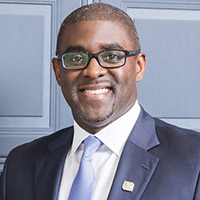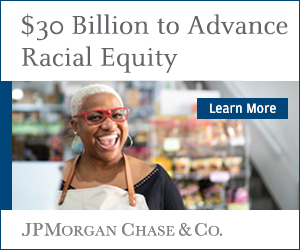
& Inclusion at JPMorgan Chase & Co.
By Brian Lamb, Global Head of Diversity & Inclusion at JPMorgan Chase & Co.
The past year has been one of the most tumultuous chapters in recent history for Black Americans, with numerous reminders that systemic racism brings devastating consequences for individuals, families and communities.
The COVID-19 pandemic is tearing through Black communities across the country, killing Black people at twice the rate of white Americans, while leaving a trail of lost jobs and shuttered Black-owned businesses in its wake. This, along with the killing of George Floyd and so many others, has sparked an outpouring of corporate support for Black Americans in recent months, and we’ve seen numerous examples of companies stepping up to make concrete changes to the way they do business in an effort to advance racial equity around the world.
As the largest bank in the United States, it’s long past time for JPMorgan Chase to own its part in creating economic opportunity and inclusion for communities that have been historically marginalized. Systemic racism is a tragic part of America’s history. It’s a congenital defect of our society that’s resulted in racial gaps across virtually every walk of American life, including wealth, homeownership, educational outcomes, health care, incarceration rates and life expectancy.
Real lives that matter are impacted by these gaps, and it’s our responsibility to do something about it, given the role of banks in the financial health of the communities we serve.
HOW JPMORGAN CHASE IS COMBATTING THE RACIAL WEALTH DIVIDE
Over the past few months, we’ve reviewed our business practices, products and the role we play in communities across this country to understand the changes we need to make to address the largest drivers of the racial wealth divide. We’ve been especially focused on developing ways to expand affordable lending and housing, increase credit and capital for Black-owned small businesses, and improve access to tools that will help Black people save money and get on a path to sustained financial health.
This work led us to make a $30 billion commitment over the next five years to provide economic opportunities in underserved communities — with a special focus on Black and Latinx people. These commitments include loans, equity, and direct funding to promote homeownership and affordable housing.
We’ve set a goal of originating an additional 40,000 home purchase loans for Black and Latinx households. To do this we’ve committed $8 billion toward mortgages. We also want underserved communities to be able to take advantage of historically low interest rates, and we’ve committed $4 billion toward helping Black and Latinx households refinance their home loans.
CREATING PATHWAYS TO FINANCIAL HEALTH
Through our own research, we know that Black households tend to have lower savings and higher debt burdens than other groups. Historically, Black Americans have been forced to grapple with less access to credit, and often have to pay higher financing fees. Too many Black Americans are completely unbanked as well, which increases the likelihood of turning to predatory alternative financial services like check cashing and payday lenders.
To combat this challenge, we aim to help one million people open low-cost checking and savings accounts. To accomplish this, we must build stronger connections to underserved communities, so we’ve committed to hiring 150 new community managers. We’re also planning to open new Community Center branches in the areas that need them most, and increase our marketing outreach to our Black and Latinx populations to raise awareness of these efforts.
LEANING IN ON BLACK ENTREPRENEURSHIP
If we are to make meaningful progress in closing the racial wealth divide, entrepreneurship must be a key part of the equation. We’re committed to helping the job creators in Black and Latinx communities gain access to the credit they need to launch, grow and scale their businesses. As part of this effort, we’ve committed to delivering $2 billion in loans, and to spending an additional $750 million with Black and Latinx companies that can supply products and services to JPMorgan Chase.
We’re also going to expand our Entrepreneurs of Color Fund to support more Black and Latinx small-business owners nationwide.
As we move forward with these efforts, we know we must hold ourselves accountable if they’re going to achieve their intended impact. We are going to continually assess how these commitments are performing and will adjust when necessary. Ultimately, we know that no single company can close the racial wealth gap, but it is our responsibility to try — and to work with other companies and policymakers along the way.
We’re owning our part in this — and we’re just getting started.
Visit JPMorganChase.com/Pathforward to learn more about our efforts to advance racial equity, which include affordable housing, minority-owned businesses, financial health, workforce diversity and more.
























